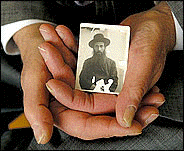The new lawsuits, which
were filed late yesterday in Superior Court in Los
Angeles, represent an escalation in a long-running
story that, some insurance experts
say, could eventually involve tens of thousands of
plaintiffs and billions of dollars in
payments, far exceeding the $1.25
billion settlement with the Swiss banks in 1998 on behalf
of Holocaust survivors.
Generali, one of the world's
largest insurance companies, is at the center of the
argument over Holocaust-era insurance.
Founded by Jewish merchants in 1831
in Trieste, it had a thriving business in Jewish
communities in Europe before the
Holocaust. Insurance policies and
annuities were often referred to as a poor man's Swiss
bank account. Tens of thousands of
people turned to these investments,
trusting in companies like Generali to pay claims if
trouble broke out in their home
countries.
Beginning in 1997, more than 20
European insurers were sued for failing to pay claims on
these policies. But most of the suits
have been settled or dismissed; the
German insurers were exempted as a result of a $5.1
billion settlement on Holocaust issues
by the United States and Germany in
2000. That left Generali as the main defendant.
What allowed the new lawsuits
against Generali to go forward &emdash; along with a
dozen existing ones, including three that are
seeking class-action status
&emdash; was a recent decision by Federal District Judge
Michael B. Mukasey in Manhattan. Generali
and another insurer, Zurich Life
Insurance, a unit of Zurich Financial Services that is
named in one of the lawsuits, tried to
persuade Judge Mukasey to dismiss
the lawsuits and force the plaintiffs to try to resolve
their claims through an international
commission that was set up to
guarantee payments.
But the judge said the
commission, financed by the insurance companies and
without judicial oversight, could not be relied
upon for fair treatment. "In a
sense," he wrote, "the commission is the company
store."
The real driving force for the
plantiffs is a deep, burning fury at what they say is the
persistent dodging and stalling of the
insurance companies, particularly
Generali, and the woeful performance of the international
commission, formally known as
the International Commission for
Holocaust-Era Insurance Claims.
For its part, Generali says that
legally it owes nothing to its old policyholders and
their heirs but that it has made efforts for
what it calls humanitarian reasons
to find policyholders and to offer compensation. It has
paid claims over the last several
years through the commission, which
was set up with the participation of three large Jewish
organizations, including the
World Jewish Congress, and
sanctioned by the United States government. The idea was
that, by adopting a nonadversarial
process, the commission would be
able to get compensation to claimants quicker than
courts.
Lawrence Eagleburger, chairman
of the commission and a former secretary of state,
initially declined to comment. But in a
statement yesterday, he defended
the commission, saying that it had "instituted a number
of creative solutions that benefit
claimants." He praised Generali and
said it had paid claims through the commission when "it
would not have been required to
do so under normal insurance
practices."
Generali contributed $100
million of the commission's $400 million -- by far the
biggest contribution by a single insurance
company -- and, like the five other
insurers that joined, was promised that regulators would
drop threats to suspend the
licenses of the insurers'
subsidiaries in the United States and try to discourage
potentially embarrassing lawsuits.
But the commission has been
criticized by survivors and insurance experts as favoring
the insurers, processing claims slowly
and offering paltry payments. Since
its inception, the commission has offered payments on
about 2,900 claims for a total of
$36.9 million. But the commission's
expenses as of 17 months ago had already climbed to $40
million. The offers average about
$12,500 each. Some have been as low
as $500, but Generali has paid some claims for several
hundred thousand dollars each,
including one for nearly $600,000.
Altogether, Generali said it had paid about $35 million,
mainly through the commission, to
2,200 claimants.
Barbara Senn, a former insurance
commissioner for Washington State, had high hopes for the
commission. But in a recent
interview she said it had been "a
huge disappointment."
Generali has maintained that it
is not liable for these policies, in part because many
were confiscated by the Nazis, who then
demanded payment. Later,
governments took over the company's offices in many
countries. While the policyholders may not
have received the money, "the
insurance company paid somebody," said Kenneth Bialkin, a
partner at Skadden, Arps, Slate,
Meagher & Flom, who is leading
Generali's legal team.
Generali said on Friday and
Sunday that its operations in Czechoslovakia were taken
over in May 1945, before Mr. Weiss
says his family was rebuffed for
lack of documents.
But Tomas Jelinek, who served as
an economic adviser to Vaclav Havel when he was president
of the Czech Republic, said in
a telephone interview that the
nationalization of insurance companies in his country
began after a presidential degree was
issued on Oct. 24, 1945. Guidelines
for procedures were not published until October 1946. In
a hearing on Holocaust insurance
in Miami on May 19, 1999, Ricardo
Nicolini, a senior Generali executive, said the takeover
of Generali's offices took place on
Nov. 20, 1946.
Generali maintained in a
statement that it was never company policy to demand
death certificates and policies from
Holocaust victims and that it was
unaware of any Generali customers who were treated that
way. In 1999, however,
Generali paid a reported $1.25
million to settle a lawsuit by Adolf Stern, a retired
owner of necktie stores in New York.
Shortly after getting out of
Buchenwald in May 1945, Mr. Stern said, he made his way
to the Generali offices in Prague,
hoping to collect on a policy on
his father, who died in Auschwitz. But he said Generali
demanded to see a death certificate
and a copy of the policy.
Reminded of the Stern case, a
Generali executive in New York said Mr. Stern had since
backed away from that statement.
Reached in Miami on Sunday, Mr.
Stern said he stood by his account.
Mr. Weiss has received an offer
through the commission of about $2,000, or five times the
original value of his father's policy.
"They're offering me something
ridiculous," he said. "For all these years, they were
trying to avoid paying. Now, I'd rather
have nothing than that they should
write me off with $2,000."
Jack Brauns, a retired surgeon
in Southern California, said he was offered $5,000 for a
$2,000 policy that he first tried to
collect on in Rome in 1945 after
getting out of the concentration camp at Dachau. He sued
Generali nearly three years ago.
One of the other new plaintiffs,
Suzanne Weiner-Zada, an artists' representative in Los
Angeles, is trying to get payment for a
handful of policies, including one
on her 10-year-old brother, Laszlo, killed in Auschwitz.
Like Mr. Weiss, Mrs. Weiner-Zada
says that Generali insisted upon
proof of coverage. Last July, through the commission,
Mrs. Weiner-Zada received a
settlement offer of $10,533, which
was raised over the weekend to $16,012. She became
furious, she said, when she was asked
to acknowledge in writing that
Generali was acting out of charity and not in fullfilment
of any obligation.
"It's like they're offering this
money out of the goodness of their heart, that I should
be grateful to them," she said. "But I'm not
grateful to them. My father paid
for this policy, and I should be able to enjoy the
benefits. That I have to be grateful to them is
such a cry for injustice that the
sky should fall."
As the case moves forward,
lawyers for both sides have been taking videotaped
depositions of the plaintiffs, all of whom are
elderly and may not live to see a
trial.
Though billions of dollars are
at stake, Generali's finances are strong. Its earnings
lately, like those of other European
insurers, have suffered because of
the slump in the markets. In 2002 it reported a loss of
754.5 million euros (about $777
million) on revenue of 46.9 billion
euros. But it reported capital and reserves of 8.6
billion euros.
In a business that relies
heavily on public trust, insurance experts say the
potential damage to Generali's reputation from
having survivors testify in court
that for decades it ignored or denied their claims, is
far more worrisome than the immediate
costs of any settlement.
"They don't want to be tarred
with the historical responsibility" of not having paid
claims they should have paid, said Daniel
Kadden, a former aid to the
insurance commissioner of Washington and a consultant to
Holocaust survivor organizations.
.

